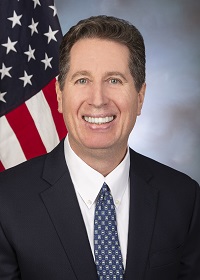By Dan Gephart, July 23, 2024
Twenty-two percent.
That’s approximately what is left of the nearly 3,800 case inventory that the Merit Systems Protection Board inherited when its quorum was restored in March 2022. MSPB Chair Cathy Harris’s swearing-in ceremony three months later gave the Board full occupancy, and the race to tackle those cases began in full.
Harris knew she had a monumental task before her, but she wasn’t worried about the actual work.
“I litigated before the MPSB and the EEOC for about two decades before I came into the job. And I thought I knew everything about MSPB cases. Oh, this is going to be easy, so simple because I know these cases.”
It wasn’t.
“There were all these cases I had no idea about which I never experienced dealing with as a litigator – restoration cases, for example. This is not something my firm focused on. And then the fact scenarios of these cases are always surprising. Just when you think you’ve seen it all, something else comes up. I’m not just talking about employee misconduct. I’m talking about how management deals with situations. The number of management errors and strange areas of misconduct that people get themselves into are just truly astonishing.”
We caught up with Harris two weeks after Henry Kerner, the former Special Counsel, was sworn in to bring the board back to full strength. [Editor’s note: We interviewed Vice Chairman Raymond Limon last month and an interview with Kerner is forthcoming.]
DG: Based on the cases you’ve reviewed, what’s the mistake made most often when it comes to discipline?
CH: One of the biggest errors I see is management choosing the wrong charge to try to encapsulate the employee’s misconduct. It shouldn’t be that difficult to choose the correct charge. Sometimes, management overreaches beyond what the employee did, or just mischaracterizes what the employee did and chooses a charge that’s just not appropriate.
To avoid these errors, managers should work carefully with [human resources] staff and attorneys to try to make sure the charge fits the misconduct.
The other thing I’d recommend is to try to resolve cases before they get to the Board. I see a lot of situations that could’ve been resolved through better communication, better performance management, better discipline management, better warnings to the employee instead of letting things get to a head.
I’m a big fan of mediation at the Board. I think if agencies were spending a little more time and resources on mediation internally, a lot of these problems would go away, and they’d have better outcomes with their workforce.
DG: In our interview two years ago, you said the Board was trying to identify cases that might be appropriate for settlement. How did those efforts go? And what did you learn from them?
CH: Our efforts, I think, were very instructive. We conducted a six-month pilot program from October 2022 through March 2023, called RAMP – the Rapid Assessment Mediation Program, where mediators worked full time attempting to settle appeals at the PFR level.
They settled quite a few. But when the pilot ended, we determined that our limited resources would be best used in issuing decisions in our inventory.
We continue to have a mediation process through our [Mediation Appeals Program or MAP], a well-established program in which administrative judges and other experienced, trained mediators on staff at the Board mediate cases. But the numbers are not that high in settlement at the PFR level. At the PFR stage, we find parties tend to prefer decisions. We’ll keep working on that. I do feel parties should be interested in settlement, even at the appellate level.
DG: Are there certain types of cases that lend themselves more to settlement?
CH: The cases in which there had been a change of law since the initiation of the appeal to the time the case was in the RAMP program. For example, the change in law from the Federal Circuit on performance, Chapter 43 cases. The agencies had to prove another element in order to prove their case. Because that wasn’t done across the board, I think those cases were more ripe for settlement.
Also, there was an evolution of law on the [Department of Veterans Affairs] 714 cases. And those also, I think, were more ripe for settlement at the appellate stage.
At the PFR stage, the parties are pretty set in their interpretation of the facts. The laws that evolved, changed, or crystallized, have allowed, maybe, the parties to get into settlement.
DG: Speaking of Chapter 43 performance actions, we’ve seen several remands because of the need for the pre-PIP Santos justification. Can you explain exactly what type of evidence and format the Board is looking for in Santos documentation?
CH: I can’t really speak to that because it’s different in each case. We look at each case very specifically. Agencies do things differently. Their performance management systems are different. There’s no one right way. Employees’ performance expectations are factually specific.
What I can say without giving an advisory opinion here is that the evidence and the format of the performance expectations need to be sufficient to meet the legal requirements of establishing whether an employee successfully performed under their performance plan. But that’s going to look different in each case.
DG: Early on, the Board seemed to be prioritizing whistleblower cases. As you continue to work through the case inventory and new cases, is there a new priority?
CH: Whistleblower cases make up about 25 percent of our docket. It’s a big percentage and we of course take our mission very seriously to protect whistleblowers from retaliation. We’re evaluating everything very carefully.
When I came on the Board, I said that I wanted to prioritize whistleblower cases. I wanted to prioritize cases where the person is most likely to get back pay. I wanted to prioritize cases that involve disability retirement, and pretty soon I’m listing almost every kind of case the Board has. Because they’re all important, right?
We do prioritize certain cases, but at this point it’s about dealing with the oldest cases and the newest cases at the same time.
DG: Have you seen any trends in new PFRs that are being filed?
CH: You know, MSPB cases reflect what’s going on in society as whole. We’re still working through the inherited inventory. I’m looking at cases from 2020, 2021. That’s mostly what’s on my docket now. We’ve been seeing cases involving COVID leave issues, COVID vaccine issues, and the like, issues involving telework, that expanded during the pandemic.
Our approach, which I think has been very successful, is we started with the oldest cases. We were also simultaneously doing the newest cases because we didn’t want to have a permanent case update review team updating the cases due to the passage of time, evolutions in law.
I’m doing current cases and older cases. We’re seeing different trends based on what’s going on in the world.
DG: Those topics – the COVID leave cases, the vaccine cases – bring me right back to 2021.
CH: Yes, it’s a little traumatic to look back, you know.
DG: Where are you at with the inherited inventory?
CH: We have 22 percent left. I think we’ve done an incredible job. And, you know, agencies have backlogs for a lot of different reasons. I think the way we handled it can be helpful to other agencies and to ours in the future. What we did is very consistent with all the advice we’ve seen on how to handle a backlog of cases.
One, don’t hide your head in the sand, try to have a plan. Do prepare and don’t be afraid to put resources on tackling the backlog and shift things around, add resources, repurpose duties so you can make sure you’re addressing the problem.
The other thing we do really well at the Board is we have a good system for drafting opinions. We have an extraordinary team of lawyers in our Office of Appeals Counsel. They draft decisions for our review. They did an incredible job of queueing everything up for the Board Members.
We also have a very good Clerk’s office, who have done a good job figuring out where the cases are and how to get them to us.
The other thing we did very well–now, I wasn’t there so I don’t give myself credit for this, I credit the career employees, who during the lack of quorum, took the opportunity to transition to an electronically-based system from a more paper-based-system. This builds efficiencies and makes things a lot better, a lot quicker. This, I think, is the first Board to be doing everything electronically. When I first came, they were still carting some paper back and forth to the Board offices. I’ve looked at a paper file maybe five times in the past two years. I love paper, but it’s not efficient.
All of those things have been really helpful. I think staying mission-oriented helps, too. We really care about the fact that parties have been waiting for years for the adjudication of their matters. And that’s not fair. We feel terribly for them. It puts a lot of lives in limbo. So, I think we’re really motivated.
I think all of those things together is a really good recipe for eradicating an inherited inventory.
DG: What you’ve done will be a case study for years to come, I think.
CH: I hope our pain helps other people. I hope it’s helpful to somebody. I’m really proud of the work we’ve done. I think we’re working really hard, and it looks to me like we’re going to be able to wipe out that inherited inventory around the end of this calendar year.
Listen, there may be some cases that hold over because they’re hard or long or strange or thorny, but, for the most part, we should be in really good shape.
DG: According to last year’s FEVS, morale has fallen at the MSPB. What is the agency doing to address it? And what do you think is the cause?
CH: The FEVS scores come out earlier for agencies than the rankings come, so we’ve had that information for quite some time. We’ve been able to start to address it.
I think there are a few causes. It’s difficult for an agency to be without political leadership for an extended period of time. That had a significant impact on morale on the agency. I think the pandemic had a significant impact. There are a lot of unique aspects to our agency that have caused it to come to this.
What we’ve done is initiated what we call the Continuous Improvement Team to try to address the issues identified as most ripe for improvement through the FEVS and our own internal surveys. The four areas we’ve identified we need to work on most are:
- Innovation
- Management communication
- Employee input on decision making
- Work-life balance
This team got under way earlier this year. We have a Professional Association, otherwise known as a union, at our agency. We have members of the Professional Association and managers on the Continuous Improvement Team working together, as well as employees from other areas of the agency outside of the bargaining unit.
We’ve already engaged employees on the topic of innovation, regarding where and how folks feel the agency is not supporting innovation. In order to fix it, we first need to know what people mean.
The FEVS is a great starting point, but it doesn’t give you all the answers.
We need to be willing and able to engage to find out: What do you mean by innovation? How can we do better? What does innovation mean to you? We have to get in deep on these topics and find out ways we can take action.
The Continuous Improvement Team anticipates making recommendations on innovation this summer, which will be followed by more communication, and trying to figure out action items, and then we’ll move onto the next topic.
Listen, we have to try to improve. If we’re not trying, we’re not going to improve. I think we have the most dedicated and intelligent and mission-oriented employees in the entire Federal government. I want them to be happy and I want to understand what will make them happier.
I’m grateful for the FEVS and grateful for the Partnership for Public Service that enables us to look into these issues. We’re looking forward to finding out everything we can do to make things better.
One other thing. This is really important. One of the questions on the FEVS that concerns me most is: “I don’t think my response to the survey is going to make a difference.”
I can assure the employees at our agency that is absolutely false. We are taking these things very seriously. We’re devoting a lot of time and effort to analyzing the FEVS results over five years to try to isolate these areas, to figure out what can be better. We’re putting the time in to have a continuous improvement team.
I really hope people understand we’re taking it very seriously.
One of the areas employees identified is they fear reprisal for voicing concerns. We’ve done a lot of work to try to address that. We’ve done extra training for managers and supervisors this year to address how to handle employee’s perceptions regarding reprisal, how to better communicate.
This is our mission. We need to walk the walk and talk the talk. I want to make sure that’s something everyone knows. That’s something I can do as a leader from the top down to ensure that we don’t tolerate retaliation against any employee.
DG: Henry Kerner was sworn in recently as the third Board member. How important is it for the Board to have all three members?
CH: Two things.
First of all, we’re a bipartisan independent agency. So, having representatives from both parties makes us a better Board. It makes us more credible to the Federal employees we serve and to the public as a whole. You’ll see most of our decisions are unanimous, the vast majority, and I expect that to continue with Mr. Kerner joining us. That’s because the Board has built up a very robust body of law over the past 40 years, and it doesn’t matter what political party you’re a part of: We all support and protect the merit system.
That’s the first thing. It makes us more credible.
The second thing I’m particularly excited about is Henry can help us to get these cases out. The more the merrier, as far as I’m concerned. Henry is a great guy. He’s rolled up his sleeves. He’s already voted, and we’ve already issued some of the cases he’s voted on. We’re happy to have him. He’s a real pleasure.
Related Training
- August 13-14: Hearing Advocacy: Presenting Cases Before the MSPB and EEOC
- September 9-13: MSPB Law Week

 By
By  By
By  By Frank Ferreri, July 17, 2024
By Frank Ferreri, July 17, 2024 By
By  Just over two years ago, we
Just over two years ago, we 
